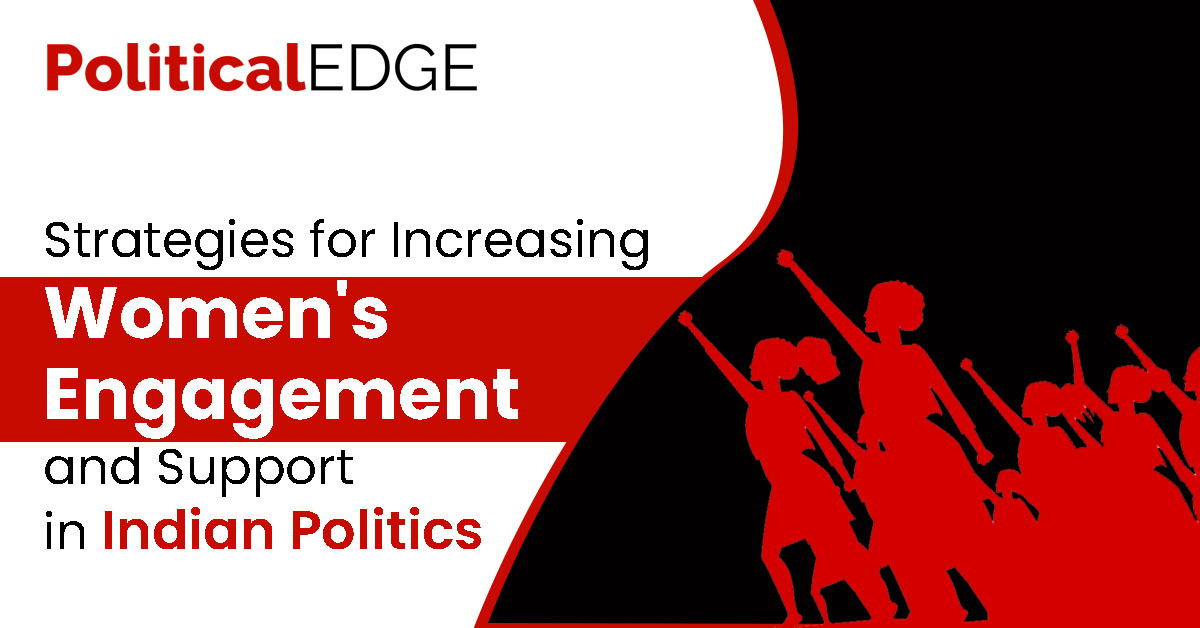
India, a nation with a rich and diverse political landscape, is marked by the persistent underrepresentation of women in politics. Despite numerous achievements in various fields, women continue to face barriers when it comes to active participation in political decision-making processes. This blog explores comprehensive strategies aimed at increasing women’s engagement and support in Indian politics, emphasizing the importance of a more inclusive and representative democracy.
What is the Reason for the Low Participation of Women in Politics?
The low participation of women in politics as voters can be attributed to a combination of social, cultural, and structural factors, such as:
- Historically, patriarchal norms and gender roles have often relegated women to the private sphere, limiting their involvement in public affairs.
- Cultural expectations and societal norms can create barriers that discourage women from actively engaging in the political process.
- In some regions, women may face educational disparities, limiting their awareness of political issues and processes. The lack of political education and awareness can result in women feeling less empowered or informed to participate meaningfully in elections.
- Economic disparities, coupled with limited access to resources, can hinder women from actively participating in campaigns, attending political events, or even accessing information about candidates.
Addressing these challenges requires a concerted effort to promote gender equality, provide political education, and create an inclusive political environment that encourages women to exercise their right to vote.
What are the Solutions and Interventions to it?
Educational Initiatives
One crucial step towards empowering women in politics is through targeted educational initiatives. Specialized training programs can equip women with the essential skills required for successful political careers, ranging from effective public speaking to strategic policy understanding. Additionally, awareness campaigns play a pivotal role in informing women about their rights, the political process, and the significance of their active participation. By investing in education, we can pave the way for a new generation of informed and empowered women leaders.
Reservation Policies
Addressing the gender gap in Indian politics requires a reevaluation of reservation policies. While reservation of seats for women exists, there is room for improvement. Advocating for an increased percentage of reserved seats and implementing a mandatory rotation system within these seats can prevent the consolidation of power within specific families or communities. These measures ensure a more equitable distribution of political opportunities and foster a diverse and dynamic political landscape.
Financial Support
Financial barriers often discourage women from entering politics. To mitigate this, it is crucial to provide financial support for women candidates. Subsidized campaigning can level the playing field, making it more accessible for women with limited financial resources. Moreover, encouraging corporate sponsorship for women politicians can contribute to financial independence, reducing their dependence on traditional funding sources and opening new avenues for support.
Technology Integration
In the digital age, leveraging technology is essential for political success. Establishing a strong online presence through social media and other digital platforms can connect women politicians with a broader audience. To facilitate this, tech literacy programs must be implemented to ensure that women are equipped with the necessary skills to navigate and utilize technology effectively. By embracing technology, women politicians can amplify their voices and engage with constituents on a more significant scale.
Support Networks
Building robust support networks is vital for women navigating the complexities of Indian politics. Mentorship programs that pair experienced female politicians with newcomers can provide invaluable guidance and support. Additionally, the creation of women’s caucuses within political parties can offer a platform for collective advocacy and address specific concerns that disproportionately affect women. These support networks foster a sense of community and solidarity, empowering women to overcome challenges in their political journeys.
Policy Reforms
Advocating for policy reforms is instrumental in creating a more gender-inclusive political environment. Gender-responsive policies that address issues such as healthcare, education, and workplace discrimination are essential. Political parties must adopt inclusive decision-making processes, ensuring that women’s perspectives are considered at all levels of policy formulation. By championing policy reforms, we can create a legislative framework that actively addresses the needs and concerns of women in India.
Public Awareness Campaigns
Shaping public perceptions is crucial for breaking down gender stereotypes in politics. Positive media representation of women in politics can challenge existing norms and inspire the younger generation. Celebrating success stories of women politicians who have made significant contributions underscores the importance of women’s leadership. Public awareness campaigns play a pivotal role in changing societal attitudes toward women in politics, fostering an environment that encourages and celebrates their active participation.
Conclusion
Empowering women in Indian politics demands a holistic approach that encompasses education, policy changes, financial support, technology integration, support networks, and public awareness. By implementing these strategies, we can take significant strides towards achieving a more inclusive and representative democracy. The time has come to bridge the gender gap in Indian politics and unlock the full potential of women as leaders and decision-makers in shaping the future of our nation.

